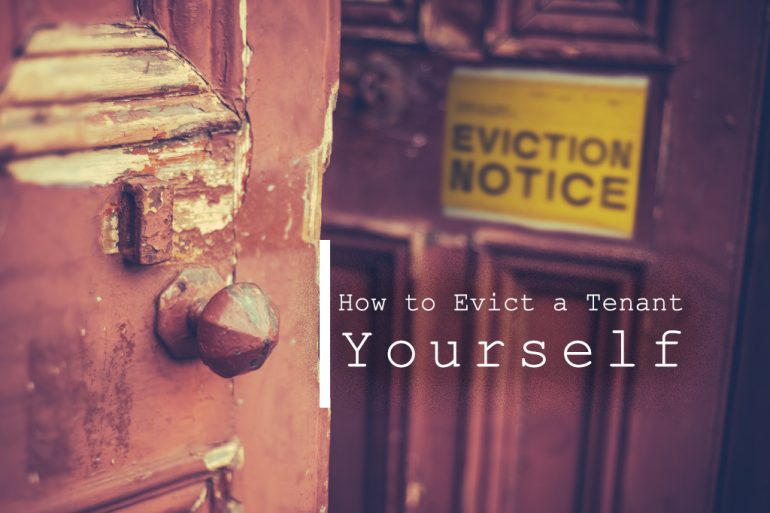How to Evict a Tenant in 5 Simple Steps Yourself
You successfully bid at auction, rented the property out, and now find yourself dealing with every landlord’s nightmare — your tenant refuses to pay. Learning how to evict a tenant is something all serious investors should learn. How can you get them out legally so you can put that rental back to work for you? When you exhaust other options, an eviction becomes necessary.
The legal process for removing a tenant is called an eviction proceeding. These lawsuits are filed in the county court where your rental property is located. In an eviction proceeding, you can sue to get possession of the property and for damages.
Already Confused? Here’s How the Eviction Process Works
There are several potential outcomes, but here’s what should happen: If possession is granted, the sheriff will serve a writ of possession against your tenant and remove them from your property. If a monetary judgment is entered, the tenant will have clear direct liability for that money at a fixed interest rate in your favor. If you then record a certified copy of that final judgment in the official records of that county, or where you think the tenant may have real estate, it becomes a secured lien for ten years. Pretty awesome, right?
We’re guessing you’re pretty stressed if you’re dealing with an eviction. To put your mind at ease, we’ve listed the five basic steps you’ll need to follow to get your property (and sanity) back.
1. Post a Three-Day Eviction Notice
This is no time to be subtle! Place the eviction notice like this three-day notice on the delinquent tenant’s door or another conspicuous place on the property. The notice should clearly show the total rent
that has accrued, the last day they have to pay that overdue rent, your name and address, the place where they should make payment, the tenant’s name and address, and whether the notice was posted, hand delivered, or sent by certified mail.
In a perfect world, the tenant will pay after the three-day notice. Your rental will be back in the green and you won’t have to pay filing fees. They may also vacate after the three-day notice, which is also great! You can then find a new tenant and get back to business.
When the tenant does not pay after the notice period expires and continues to live on the property, it’s time to bring in the big guns — the court.
2. Prepare the Complaint for Eviction
The complaint must state:
- Your name and address
- That you are the property landlord
- The name and address of your tenants
- The terms of the lease
- When your tenant became delinquent
- How long your tenant has been delinquent
- The total sum of the delinquency
- That you posted the three-day notice
- That the tenant did not tender possession or pay the rent due
Your complaint can also include a count for damages, where you state what you are owed under the lease agreement. It does not matter if the lease was written or oral — a promise is a promise, and both are binding contracts so long as the lease was for less than a year.
There are three different kinds of complaints you can use:
Complaint for Eviction – The landlord may use this form when seeking to have a tenant evicted for non-payment of rent, but not seeking damages.
Complaint for Eviction and Damages – This complaint is used when the landlord seeks to obtain damages, such as back rent, cleaning costs, repair costs, etc. in addition to having the tenant evicted.
Complaint for Eviction Re-Breach – This complaint is for use when the landlord is just seeking to evict for a breach other than nonpayment of rent, and not seeking damages.
3. Prepare Your Summonses
Get ready to do some more paperwork. You must prepare a summons for eviction and a summons for damages for each of your tenants. This does not include minors on the property, but definitely count anyone who signed the written lease or adults on the property.
Take a trip to the courthouse, pay the filing fee, and get yourself a case number. The clerk will give you the summonses back signed and sealed. The filing fee is around $200. While it may put a dent in your wallet, it’s far better than incurring more losses.
Make one copy of the complaint and staple two copies of the summons for each defendant. This is called your service packet.
There are two types of Summons to use:
Summons for Damages Complaint – This is the Summons to use if you are seeking damages and looking to remove the tenant from the property.
Summons for Eviction-Only Complaint – This is a simplified version to use if you are only seeking to remove the current tenant from the property.
4. Give Your Service Packet to the Sheriff
The sheriff’s service fees vary by county, but you can expect between $50 and $100 per service packet.
When the sheriff serves your tenants, they will have five days to respond to the evictions summons and 20 days to respond to the damages summons. Your tenant may still avoid paying the rent owed or responding in a way that challenges the rent owed within those five days. You can then petition for a default judgment of possession to the court, send in a proposed judgment of possession and proposed writ of possession to the court, and BAM! You’re golden.
5. Set Your Case for Hearing
If your tenant deposits the rent within that period or files something challenging the rent owed, then you will have to set your case for hearing. This is where things can get a bit tricky. If you rent the property in your name individually, then you can ask the court for a hearing date, notice the hearing, and represent yourself as the landlord in the hearing. Your testimony will explain why the rent is owed, how you got to those numbers, and why your tenant’s defenses should be dismissed or discounted. Make sure you know your case inside and out!
If the court finds your testimony credible and your supporting evidence admissible, it will grant a judgment for eviction (that’s good news). The court will tell you to submit a proposed order that grants your petition for possession and tell the clerk to issue a writ of possession for the rental property. If the 20-day waiting period on the damages claim has passed by the time of the hearing, then the court may also find that your testimony supports the damages claim and award a final damages judgment.
The court will tell you to submit a proposed order that grants your petition for damages and instruct you to put in the statutory interest rate. You will need to send enough copies of each of the proposed final judgements to the court for you, the tenants, and the court.
But Wait — You Might Need an Attorney
If you do not rent or own the property as an individual but instead through your company (limited liability company or corporation), then once the initial eviction complaint is challenged, you will not be able to file any additional responses, set the matter for hearing, or act on behalf of your company in court. You will need to call an attorney. Why?
Basically, a non-lawyer is not allowed to represent a separate legal entity. Your job at this point is to quickly find a lawyer, preferably within a week, so that you do not waive any important responses to their defenses.
Success Is Not Guaranteed
We have to be honest — there’s always a chance that the court will not rule in your favor. Poor records of rents received or no records of monthly rent payments, cutting off the tenant’s access to utilities, or failing to repair essentials such as a water heater, electrical, roof leaks, A/C units, or fire alarms in a timely manner can justify the tenant’s refusal to pay rent. The court can then deny you possession, adjust rents, or take other undesirable actions against you.
In other words, make sure you comply with your lease obligations to increase your chances of completing a successful eviction. When in doubt, consult with an experienced real estate attorney. It’s just that easy.








